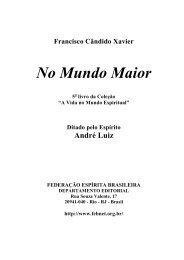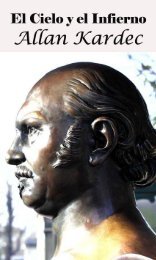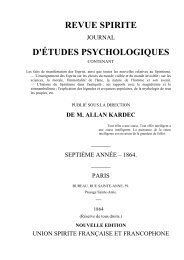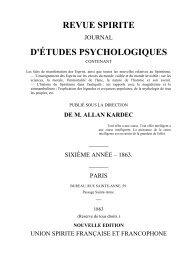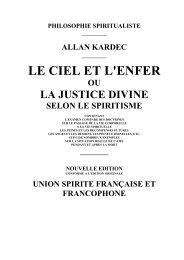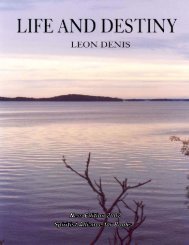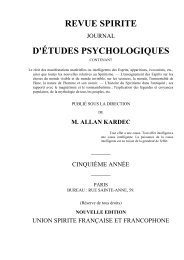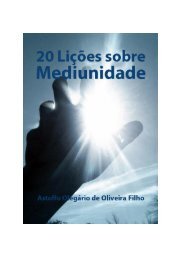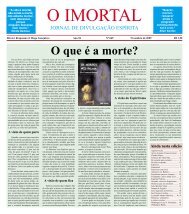PDF version - Geae
PDF version - Geae
PDF version - Geae
Create successful ePaper yourself
Turn your PDF publications into a flip-book with our unique Google optimized e-Paper software.
CHAPTER XIII<br />
THE LAW OF REINCARNATION<br />
After a time of sojourning in peace, the soul is reborn into human conditions, and carries with it the<br />
heritage, good or bad, of its past. It is born an infant, and reappears on the earthly scene to play a new act of<br />
the drama of life; to acquit old debts and to conquer new powers which will facilitate its ascension and<br />
accentuate its forward march.<br />
The law of rebirth explains and completes the principle of immortality. The evolution of being<br />
indicates a plan and aim; this aim, which is perfection, could not be realised in a single life, no matter how<br />
long and fruitful it might be. We must see in the plurality of lives the necessary conditions of education and<br />
progress. It is by its own efforts, sufferings, and strife that it redeems itself degree by degree, first on the earth,<br />
and then on innumerable dwelling-places in the starry heavens. Reincarnation, affirmed by the voices from<br />
Beyond, is the only rational form under which we can admit the reparation of faults and the gradual evolution<br />
of being. Without it, there is no conception possible of a great Being governing the universe; nor can we feel a<br />
satisfying moral sanction of existing conditions.<br />
If we declare that man lives actually for the first and last time here, that one existence only is<br />
experienced by us, we must then recognise the incoherence and the partiality shown in the distribution of good<br />
and evil conditions - of talents and faculties - of native qualities and original vices. Why to some lives constant<br />
good fortune and happiness, to others misery and inevitable misfortune? To one beauty, health, strength, to<br />
another weakness, deformity, and sickness? Why intellect, genius, and imbecility? Why so many admirable<br />
qualities, side by side with vice? Why the diverse races - some so near to animality, others favoured with<br />
powers which assure their supremacy? Why the blind, the idiots, the deformed who fill our hospitals? Heredity<br />
does not explain all that, nor can they all be considered as the result of natural causes. It is the same with those<br />
endowed with favors. Often the worthy seem crushed under trials while the wicked prosper. Why are these<br />
children born to suffer from the cradle, and why do some finish the earth life in youth, and others live a<br />
century? From whence come the infant prodigies, musicians, poets, painters, showing extraordinary talents for<br />
the arts and sciences, while others labour all their lives and remain mediocre? And how explain the inborn<br />
sentiments of dignity, or of evil, strangely exhibiting themselves in contrast with their environment?<br />
If individual life commences on earth, if nothing anterior existed for us, we must seek vainly to<br />
explain these frightful anomalies, these painful contrasts, and to conciliate them with the idea of a wise, just,<br />
all-seeing Power. All the religions and the philosophies have run against this problem; no one has solved it.<br />
From their point of view, destiny rests incomprehensible and the plan of the universe is obscured, evolution is<br />
arrested, and suffering is inexplicable. Man, forced to believe in a blind force and fatality, and in the absence<br />
of all justice, is pushed toward pessimism and atheism. On the contrary, all is explained by the doctrine of<br />
successive lives; the law of justice reveals itself in the smallest details of life. The inequalities which shock us<br />
result from the different situations occupied by souls in their infinite degrees of evolution. The destiny of a<br />
being is but the development through the ages of a long series of cause and effect engendered by his acts.<br />
Nothing is lost; the effects good and bad accumulate and germinate in us up to favorable moments of their<br />
opening, sometimes after a long lapse of time, and many existences; but they never disappear until reparation<br />
has been made by the soul. Each one brings its seed of the past from beyond the tomb to the new-born soul.<br />
That seed, according to its nature for our happiness or misery, will spread its fruits upon the new life as well as<br />
upon those to come, if the one life does not suffice to exhaust the evil of past existences. At the same time, our<br />
daily acts, sources of new effects, come to add their causes to the old, to alleviate or aggravate them. They<br />
form a chain of good or evil altogether which composes the woof of our destiny.<br />
Moral sanction, so insufficient when we study life from the point of view of one existence, finds itself<br />
absolute and perfect in the succession of lives. There is a complete correlation between our acts and our<br />
destiny; we find in the events of our lives the rebound of our former acts. Our activities under all forms are<br />
creative of good or bad elements, from far and near, which fall on us in tempests or joyous rays. Man<br />
constructs his own future. Until now, in his ignorance and incertitude, he has constructed it while blindly<br />
groping his way, submitting to his fate without the power to explain it. Soon with better light, penetrated by<br />
63



